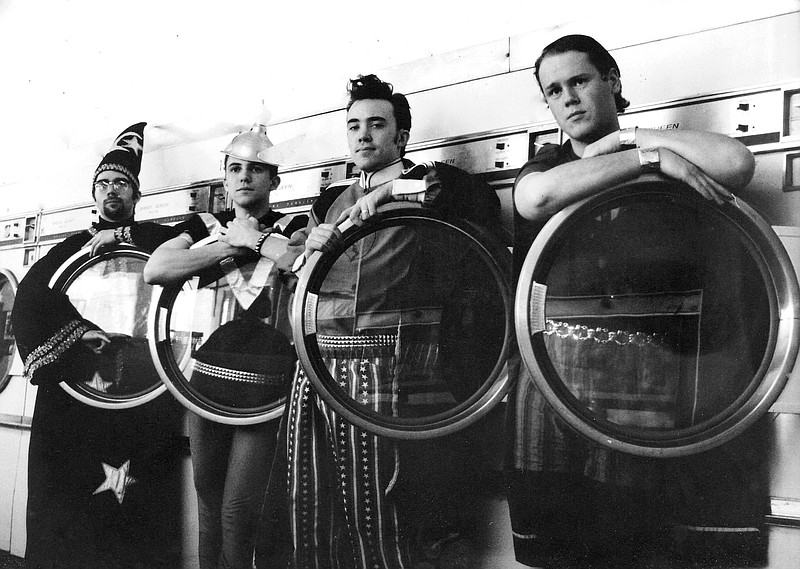Little Rock power-pop outfit Techno-Squid Eats Parliament packed a lot into its short existence.
Formed in 1992, the band included childhood pals Aaron Sarlo and Clay Bell on guitars and vocals along with drummer Shayne Gray and bassist Mark Pearrow. After winning a night in the Spectrum Weekly Musicians' Showcase — the band's second ever gig — TSEP signed to Memphis-based Ardent Records.
A self-titled debut, produced by John Hampton, who engineered The Replacements' "Pleased to Meet Me" and produced the Gin Blossoms' breakthrough "New Miserable Experience," was released in 1994. The record showcased the band's jangly, skewered college rock that at times calls to mind School of Fish and a heavier version of R.E.M. It was also one of the first enhanced CDs and included access to videos, interviews and a tour diary.
The band toured extensively, was written about in Billboard and NME and the video for the single "Rhinestones" was aired on MTV's "120 Minutes," but the album failed to find an audience. After moving to Boston, sans Gray, TSEP called it a day in 1995. Bell moved back to his home state of California, where he still performs; Sarlo returned to Little Rock and founded the bands Dangerous Idiots and Kid City; Pearrow is a research engineer at the Massachusetts Institute of Technology and Gray, who starred in Ira Sachs' 1996 film debut "The Delta" and has played in Central Arkansas bands, works as a nurse in Little Rock.
In 2015, the band mates recorded a follow-up, "We're Back. What Did We Miss?," and now they've reached into the archives for two collections of unreleased tracks — "Clovers in the School Yard: Early Demos of Techno-Squid Eats Parliament" and "Waiting for Titans: Techno-Squid Eats Parliament Live in Studio Volume 1," which are available at the usual streaming services and the group's Bandcamp page, https://technosquideatsparliament.bandcamp.com/releases.
The two albums are a reminder that songwriters Sarlo and Bell had a wicked knack for alt-pop gems loaded with sprightly melodies and bent humor. "The Awakening," a low-fi anthem from "Clovers in the School Yard," is a particularly strong track that sounds as if it arrived in a time capsule from the patchouli-doused studio of 1994's coolest college radio station.
Pearrow, 51, remembers it well.
"Dude, I just got chills when you mentioned that," he says. "I loved to play that song. Just thinking about the rush we used to get onstage. People would really get into that song."
Another track, "When Life," was actually known to the band more by its working title, "B Minor Ninth," which a friend misheard as "Be Mine Tonight."
Sarlo's "Apollo," from "Titans," with its rubbery bass and driving drums is a long-lost summertime ripper, and there are hammy forays into alt-country with "Second Sight" from "Clovers" and "Lone Star" on "Titans."
"'Lone Star' cracks me up," Gray says. "I'm glad people are going to get to hear that. '24' is also really good. Some of it is almost like Buzzcocks punk, and some of it sounds almost like folk."
Musically, the band members brought different influences to what became TSEP's sound, according to Pearrow. Bell grew up performing folk and bluegrass songs with his family; Sarlo leaned toward a mixture of prog-rock and bands like Tears for Fears while Gray was into postpunk heroes like Joy Division and The Cure.
"I listened to both kinds of music — death metal and heavy metal," Pearrow says with a laugh. "Looking at it from the outside, it was kind of a hot mess, but once we got together we came out with a melodic thumbprint that could occasionally be violent and also deeply thoughtful."
"It was this weird thing that worked with the four of us," says Gray, 50. "We would write songs and practice two or three hours a day almost seven days a week. You get really tight doing that."
The 13 tracks on the two new releases were recorded live with minimal overdubs at Ardent Studios in Memphis and at Maness Studios in Little Rock, Pearrow says. The unreleased tracks hew closer to the band's rougher live sound, which was lost in Hampton's production of the debut album, Pearrow adds.
"We were a live band, hands down. The huge difference between the studio album and the new/old songs is that these were recorded live to two-track. It was us, in the studio, all together."
Some of the tracks will be familiar to longtime fans because the band played them live, Pearrow says.
Revisiting these songs "brings back a whole raft of memories," he adds. "Sometimes it's hard to believe it was us. After the band broke up, it was like losing a loved one and I put my instrument away for a decade and I lost a lot of ground technically. The upshot is that when I listen to these albums, I'm like, I don't remember how I did that."
